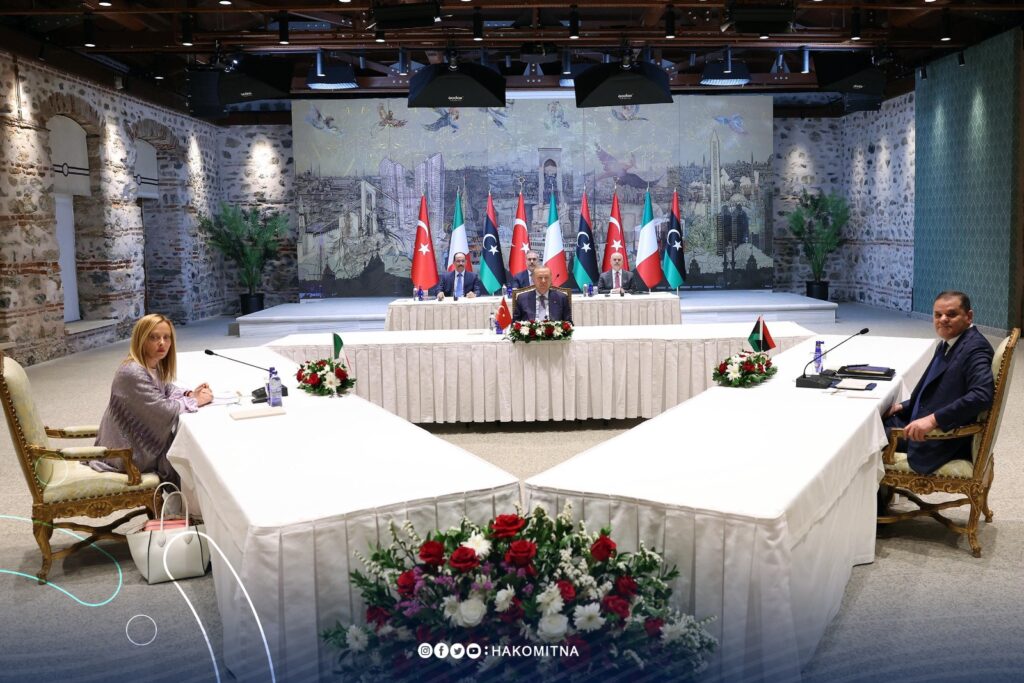Tripoli— At a trilateral summit in Istanbul on Friday, PM Abdulhamid Dbeibeh said he stressed the importance of a “balanced regional partnership and enhanced economic cooperation” and presented his view of a “coordination on irregular migration issues,” according to a statement by the Government of National Unity (GNU).
The summit, termed Turkish media as a “surprise meeting at Dlomabahce Palace on the banks of the Bosporus,” brought together the Turkish President Recep Tayyip Erdogan, Italian Prime Minister Giorgia Meloni and PM Abdulhamid Dbeibeh of Libya. It focused on the management migration flows, regional cooperation, stability, and economic integration in the Mediterranean region.
Dbeibeh underlined the need to adopt an approach that addresses the root causes of the migration problem, and emphasized that Libya “does not and will not accept their [migrants] resettlement on our soil,” the statement said.
During his speech at the summit, Dbeibeh said, “Libya is keen to consolidate effective partnerships based on mutual respect, and that it is working to restore its regional role as an effective and reliable partner,” it added.
Mr. Dbeibeh sought cooperation with Italy and Turkey in the fields of energy, oil and gas, and infrastructure, and linking Libya to regional projects in the Mediterranean.
On her part, PM Meloni wanted Libya to learn from the Turkish experience in the management and combating migration flows to Europe. She also “reaffirmed Italy’s commitment to Libya’s stability, unity and independence, and its support for a Libyan-led, UN-facilitated political process leading to elections,” according to Italian media.
Also at the summit, PM Dbeibeh proposed holding a four-party ministerial meeting (Libya, Italy, Turkey, and Qatar) aimed to launch joint projects in the logistical, technical, and humanitarian fields, according to reports in the Italian media.
He said, “Doha has already expressed operational availability.” Such joint project would include “coordinating repatriation policies, exchanging information on irregular migration flows, and combating criminal networks active along the African route.”
Neither the Turkish nor the Italian sides made it clear whether they agreed on Tripoli’s proposal or not. Nonetheless, according to Turkish media, it was agreed that cooperation committees from the three countries would convene first to identify concrete actions to be carried out jointly, within a clearly defined time frame, followed by a leaders’ meeting to review decisions taken.
On his part, President Erdoğan underlined the importance of joint efforts by Türkiye, Italy and Libya in addressing the challenges facing the Mediterranean basin. “Sustainable, long-term solutions, as well as multilateral coordination, are needed to eradicate the causes of irregular migration,” Erdogan said as quoted by the Italian Novanews.
Both Turkey and Italy are NATO allies and have common interests in Libya. They have cemented their economic, political and military relations in recent years, taking into consideration the volatile situation in Ukraine, the Middle East and North Africa. Erdoğan visited Rome in April and held talks with the Italian PM for the fourth time. The present and the future of Libya was one of the main topics discussed by him and Ms. Meloni.
Historically, Libya fell under both the Turkish and Italian control for four centuries. Turkey occupied Libya for 360 years under the Ottoman Empire beginning in 1551 to 1912. The Italian colonization of Libya began in October 1911 and it lasted until 1943.
After a year of fighting between the Italian invaders and the Libyan resistance who were partially assisted by some Ottoman army officers, the Ottoman government, under pressure during the First Balkan War, signed the treaty of Ouchy on 18 October 1912, whereby it conceded its rights over Libya (including Tripoli and Cyrenaica) to Italy.
